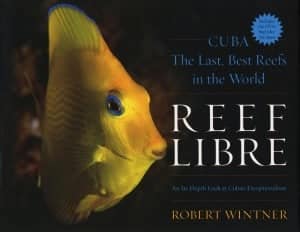
Cuba reefs host apex predators and coral cover at optimal levels. While Cuban reef vitality may be linked to economic default and no shoreline development, no agricultural pesticides or fertilizers and limited human population growth, the Castro regime is aggressively developing its reef potential. Seas to the south are now 100% shark protected. Most Cuba travelogues advise “getting off the beaten path,” but Reef Libre examines that path, to see where it might lead as things change. Will Cuba reefs remain protected? Or is this perilous age of natural decline a last chance to see a healthy reef system? Robert Wintner and the Snorkel Bob Jardines de la Reina Expedition herein provide narrative insight with photos and video. First stop is the baseline: Havana urban density. Down south at Cayo Largo, reef collapse seems imminent with 600 guests changing daily, and the phosphate-laden laundry water flowing directly to the deep blue sea. Will Cuba’s Ministry of Tourism step up with the Jardines de la Reina paradigm? Rising from the Golfo de Ana María, Jardines is a thousand square miles of mangrove estuary, for ages compromised by constant extraction of its biggest predators, taken as food. Protected, it now rises on the world reef stage.
This book is an interesting mix of history and beauty. It contains absolutely beautiful pictures of the Cuban reefs. Vivid images of colorful fish and muscular sharks jump off the shiny pages. I read this book at the dining room table and my son climbed right into my lap so he could see the pictures up closely. He was so excited to see the fish that I had to put aside reading the text for another time. He pointed out all of his favorites then flipped the pages back and forth time and time again to make sure he didn’t miss any.
This is a beautiful coffee table quality book. The front cover image displays a beautiful yellow fish and is one of the most striking images in the book. This book isn’t just about the beautiful Cuban reefs though. It also contains many images of Cuba and the residents who live there. It provides a detailed history of the land and the impacts that US relations have had on the land, sea and inhabitants there. The author provides extensive information on the conservation efforts in Cuba and how the lack of tourism has allowed Cuba to maintain spectacular sights in deep contrast to tourist heavy reefs located in his home state of Hawaii.
It is equal parts beauty and history, which makes for a very interesting read with incredible images that make it feel a bit like a very complex travel guide. The book includes a DVD, which brings the images in the book to life. The tone of the movie is quite laid back, told in a conversational way that is both accessible and interesting. I thoroughly enjoyed reading this book and watching the accompanying film.
Best known as Snorkel Bob in Hawaii and around the world, Robert Wintner captures Cuba above and below the surface with urgency and hope. As a pioneer in fish portraiture, Wintner demonstrated social structure and etiquette in reef society. Reef Libre goes to political context, in which human folly will squander Cuba’s reefs as well—unless natural values can at last transcend political greed. As pundits joust over who did what to whom and why, Wintner ponders reef prospects in view of political changes.
Robert Wintner has authored many novels and story collections. Reef Libre is his fourth reef commentary with photos and his first overview of survival potential in a political maelstrom. He lives and works in Hawaii, still on the front lines of the campaign to stop the aquarium trade around the world.
Thank you, Frugal Girl, for loving Reef Libre. You demonstrated that reef love covers all ages. I’m gratified by your appreciation.
Sounds like a beautiful book!